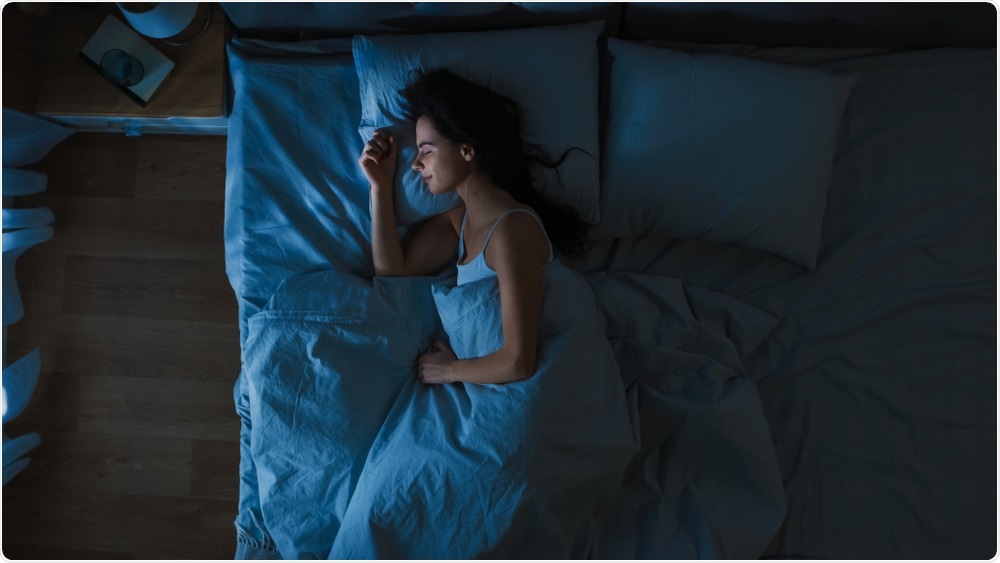
Deep sleep may reduce anxiety levels
A study conducted by researchers at the University of California, Berkeley, has found that a sleepless night can raise anxiety levels by up to 30% the following day.
 Image Credit: Gorodenkoff / Shutterstock.com
Image Credit: Gorodenkoff / Shutterstock.comThe study, recently published in the journal Nature Human Behaviour, also showed that a sufficient amount and quality of sleep could keep people calm and reduce stress.
Anxiety is the most common mental health problem in the United States
According to the Anxiety and Depression Association of America, anxiety is the most common mental health problem in the United States. About 40 million adults in America (approximately 18% of the country’s population) are affected by anxiety every year.
Researchers divide sleep into two main categories - REM (rapid eye movement) sleep and non-REM sleep, as well as four substages. The first two stages of non-REM sleep are phases of light sleep where the body adjusts from an awake state to a restful state.
The third stage of this non-REM sleep is the deep, replenishing sleep that people need to feel recharged once awake again. These sleep stages are followed by REM sleep - the lighter, dream-filled stage of sleep people experience before waking up.
The various sleep stages have different effects on specific brain regions, which can be monitored using techniques, including functional magnetic resonance imaging (fMRI) and polysomnography.
For the current study, the researchers determined what effects the different sleep stages had on anxiety levels by scanning the brains of 18 adult participants who completed an anxiety questionnaire.
The participants were asked to watch emotionally disturbing videos following a night of sufficient sleep and a night of insufficient sleep. Following each viewing, they completed an anxiety questionnaire called the state-trait anxiety inventory. The researchers used fMRI and polysomnography to scan the participants' brains while they were asleep to identify different sleep stages.
A sleepless night seemed to deactivate the medial prefrontal cortex
The scans revealed that after a sleepless night, a region of the brain called the medial prefrontal cortex was deactivated. Research has previously shown that this area of the brain is involved in relieving anxiety and stress. The scans also showed that regions of the brain thought to process emotions were overactive.
In addition, responses to the questionnaire showed that after a sleepless night, the participants’ anxiety levels increased by up to 30%.
"Without sleep, it's almost as if the brain is too heavy on the emotional accelerator pedal, without enough brake,” says senior author Matthew Walker.
The team also found that anxiety levels were reduced following a full night of sleep, particularly when the participants spent more time in the deep, restorative, non-REM stage of sleep.
"Deep sleep had restored the brain's prefrontal mechanism that regulates our emotions, lowering emotional and physiological reactivity and preventing the escalation of anxiety," reports Ben-Simon.
Replicating the findings
Next, the team set out to replicate the findings by performing further lab experiments in a larger set of 30 participants and conducting an online survey of 280 individuals.
The laboratory studies confirmed that individuals who spent more time in the deep non-REM stage of sleep at night were the least anxious the following day. The survey confirmed that the amount and quality of sleep participants got from one night to the next accurately predicted anxiety levels the next day.
“Ecologically relevant night-to-night variability in sleep within individuals predicted consequential day-to-day changes in subjective anxiety state—an effect that was independent of alterations in mood as well as in trait,” write the authors.
“These micro-longitudinal experiments not only corroborate the results of the in-laboratory experiment manipulation of acute total sleep deprivation but demonstrate that subtle alterations in nightly sleep quality are sufficient to result in consequential next-day changes in anxiety.”
A full night’s sleep should be recommended in the treatment of anxiety
Ben-Simon suggests that getting a full night’s sleep should be incorporated into clinical recommendations for the treatment of anxiety.
"People with anxiety disorders routinely report having disturbed sleep, but rarely is sleep improvement considered as a clinical recommendation for lowering anxiety," she says. "Our study not only establishes a causal connection between sleep and anxiety, but it identifies the kind of deep [non-]REM sleep we need to calm the overanxious brain."
Walker says the team has identified a new function of deep sleep, one that decreases anxiety overnight by reorganizing connections in the brain.
Journal reference:
Ben Simon, E., Rossi, A., Harvey, A.G. et al. Overanxious and underslept. Nat Hum Behav (2019) doi:10.1038/s41562-019-0754-8

































No hay comentarios:
Publicar un comentario